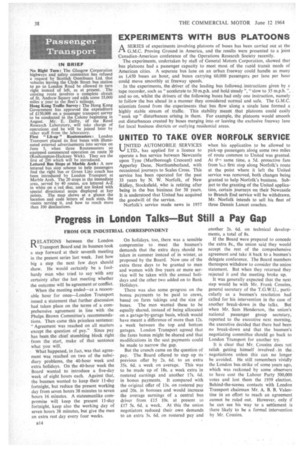Progress in London Talks But Still a Pay Gap
Page 40

If you've noticed an error in this article please click here to report it so we can fix it.
FROM OUR INDUSTRIAL CORRESPONDENT
RELATIONS between the London Transport Board and its busmen took a step forward at their seventh meeting in the present series last week. Just how big a step the next few days should show. He would certainly be a foolhardy man who tried to say with any certainty after the last meeting whether the outcome will be agreement or conflict.
When the meeting ended—at a reasonable hour for once—London Transport issued a statement that further discussion had taken place on the terms of a comprehensive agreement in line with the Phelps Brown Committee's recommendations. Then came this priceless sentence: "Agreement was reached on all matters except the question of pay." Since pay has been the chief stumbling block right from the start, make of that sentence what you will.
What happened, in fact, was that agreement was reached on two of the subsidiary problems, the 40-hour week and extra holidays. On the 40-hour week the Board wanted to introduce a five-day week of eight hours each. Against that, the busmen wanted to keep their 11-day fortnight, but reduce the present working day from seven hours 38 minutes to seven hours 16 minutes. A statesmanlike compromise will keep the present 11-day fortnight, keep also the working day of seven hours 38 minutes, but give the men an extra rest day every four weeks. On holidays, too,.there was a sensible compromise to meet the busmen's demands that the extra days should be taken in summer instead of in winter, as proposed by the Board. Now one of the extra three days to be granted to men and women with five years or more service will be taken with the annual holidays and the other two added on to Bank Holidays.
There was also some -progress on the bonus payments to be paid to crews, based on fares takings and the size of buses. The men wanted these to be equally shared, instead of being allocated on a garage-by-garage basis, which would have meant a difference of more than 12s. a week between the top and bottom garages. London Transport agreed that the fares bonus might be shared and that modifications in the seat payments could be made to narrow the gap.
But the crunch came on the question of pay. The Board offered to step up its previous offer by 2s. 6d. to an extra 355. 6d. a week on average. This was to be made up of 18s. a week extra in rostered earnings and another 17s. 6d. in bonus payments. It compared with the original offer of 13s. on rostered pay and 20s. in bonuses and would increase the average earnings of a central bus driver from £15 10s. at present to £17 5s. 6d. a week. At this the union negotiators reduced their own demands to an extra 5s. 6d, on rostered pay and
another 2s. 6th on technical developments, a total of 8s.
If the Board were prepared to concede the extra 8s., the union said they would accept the rest of the comprehensive agreement and take it back to a busmen's delegate conference. The Board members thereupon withdrew to consider the union statement. But when they returned they rejected it and the meeting broke up.
It was generally expected that the next step would be with Mr. Frank Cousins, general secretary of the T.G.W.U., particularly as a busmen's resolution had called for his intervention in the case of another break-down in the talks. But when Mr. Sam Henderson, the union's national passenger group secretary, reported to the executive next morning, the executive decided that there had been no break-down and that the busmen's negotiating committee should go back to London Transport for another try.
It is clear that Mr. Cousins does not relish getting himself involved in the. negotiations unless this can no longer be avoided. He still remembers vividly the London bus strike of some years ago, which was reckoned by some observers to have cost the Labour Party 500,000 votes and lost them the 1959 election. Behind-the-scenes contacts with London Transport chairman Mr. A. B. B. Valentine in an effort to reach an agreement cannot be ruled out. However, only if he can see his way to a settlement is there likely to be a formal intervention by Mr. Cousins.
































































































































